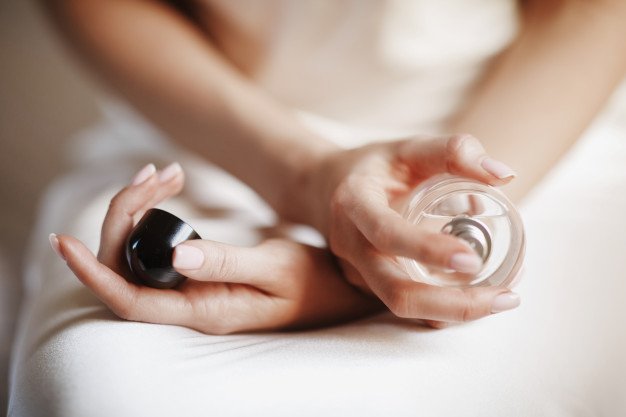A perfume smells different on those paper blotters in the department store than it does on your skin. That’s why you’re always encouraged to try before you buy. You may have also noticed that a perfume could smell wonderful on a friend or colleague but not that great on you. Besides complaining about how unfair it is to anyone who will listen, have you ever wondered why a certain perfume you love doesn’t appear to love you back?
“The most important thing when choosing a new fragrance is that it must love you back,” Micheal Donovan, the founder and creative director of St. Giles notes. “There is nothing worse than falling for a scent in a perfumery or even on a friend or a stranger in the street only to find that it just doesn’t suit your skin. Interestingly, I have noticed that people with different hair color carry scents differently too. My advice? Always check the effect of a fragrance on your skin before parting with your money.”

So why does scent smell so different on everyone? “The pH balance of the skin differs slightly, which can change the way a scent smells," says Donovan. Use a shower gel designed for sensitive skin that will help keep your pH in check.
“Scent can even be affected by your diet,” he adds. The London Perfume Company notes on its website that “edible perfumes,” otherwise known as herbs and spices, can change how your perfume smells. Hormones are another factor that can alter your perfume’s characteristics: When estrogen drops (around week three in your cycle), you may find you overheat a little more easily and sweat a tad more, and this will, in turn, affect your perfume. One study found that people are drawn to scents that will work with their natural body odor.
If you have a “normal” skin type (not dry or oily), you are likely to find that most perfumes will smell pretty true on the skin, but be aware that your pH, fluctuating hormones and diet could still affect the aroma throughout the month. Keep scrolling to find out how oily and dry skin types can change how your perfume smells.
Oily Skin
According to what George Preti, PhD, told Dr. Oz the Good Life, “Most perfumes are made with ingredients that are attracted to oil.”
If you have oily skin, it will “hold top notes for longer but can also exaggerate certain elements in the perfume,” says Donovan. “Sweet notes, I have found, can be overwhelming and almost sickly on oily skins," he adds. "Fruit, on the other hand (especially citrus), can be amazing. Notes that would just disappear on dry skin can be symphonic on oily skin.
“The general rule is that oily skin makes fragrances pop. They can turn quite modest, discreet scents into a magnum opus."

Dry Skin
“Dry skin needs bigger fragrances with a good solid base to hold up the fragrance and make it last,” explains Donovan. “Orientals and chypres work well, as do spices and the heavier blooms like tuberose. The delicate scents will disappear, so if you want to make a statement, then you need something with a strong voice.”
Want to make a fragrance last longer on dry skin? Make sure it's thoroughly moisturized with a scent-free lotion or oil before spritzing your perfume. Or try layering a scented oil with a perfume.
Is my sense of smell an issue?
Molecules are released by substances around us. When they enter your nostrils, they can stimulate receptors located on the olfactory sensory neurons in the back of the nose. Those neurons send messages to your brain, which identifies the smell. Smells can also reach the sensory neurons through a channel that connects the top of the throat to the nose. For example, when you chew food, the molecules can stimulate those neurons.
Now, you must remember that the atmosphere of your home is not the same as the store. Therefore, the molecules in the air of the store, combined with the perfume, can create a different scent than the perfume plus the environment in your home.
Different concentrations
Sometimes, the concentration of oils in the fragrance can be a factor. Pure perfume has the highest concentration, followed by eau de parfum, eau de toilette, and eau de cologne. Therefore, if you find a scent you like, you’ll want to ensure the oil concentration is best for your skin, for how long you want the scent to last, and more, doctor Chad Kessler, MD, said.
To find out more about fragrance concentrations click here.
Like this article? Sign up to our newsletter to get more delivered straight to your inbox
_____________
https://www.byrdie.com/why-does-perfume-smell-different-on-everyone
https://www.ceenta.com/news-blog/why-does-perfume-smell-different-on-my-skin
 Welcome to...
Welcome to... Austria
Austria
 Belgium
Belgium




Share:
Cupcake Day
How to Pick the Perfect Summer Fragrance?